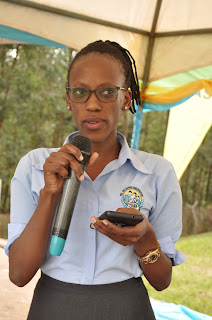Involving PLHIV in service delivery
As I take photographs during a clinic day in TASO Tororo, a lady's voice
behind me laughingly says,
"That was not a very good one. They are all looking at you instead of paying
attention to the health talk facilitator"
It turns out that the voice belongs to Judith Apai, a Community ART Support
Agent (CASA) at one of the TASO Tororo Community Drug Distribution Points
(CDDP). She has come to the Center for cervical cancer screening but she also
has pain down her right side. She tells me about how women her age (she is 52
years old) and older feel that they should not go for cervical cancer screening
because they are not sexually active. Yet Judith knows that the health workers
told them that the HPV virus can remain alive in the cervix for a while before
the cancer manifests. So she feels that after some years, she should come back
for another check up and so should others.
After telling me why she has come to the Center, she then tells me about her
life. Judith lost her husband in 1999. She was bedridden and yet at the same
time she was expecting. She thought that the stress of expecting plus loosing
her husband had affected her because she lost a lot of weight and she had a rash
in addition to having no appetite. When her baby was born, he too got a rash.
One of her sisters who had gone to see the baby, suggested that both Judith and
her baby go for an HIV test. Judith's results were positive and so she tried to
sneak into TASO while covering herself so that she could not be
identified.
With counseling and continuous treatment, the rash got cured and Judith
became more confident. She was now able to walk into TASO without hiding.
Luckily, her son was HIV negative (this was even before the PMTCT programme was
rolled out in TASO Tororo).
Today, Judith is a CASA in TASO Tororo at a CDDP with 75 clients under her
care. She also carries out continuous client education in her community. When I
told her that some clients in TASO Tororo are reported to have their CD4 count
go down, she was ready to find out more about the causes and to encourage them
to ensure that they take good care of themselves.
Judith says she is so much happier now that she is open about her sero status
and is able to help other people in the community regardless of their HIV
status.
Thanks to Judith for sharing her story and for the work she does in the
community.


Comments
Post a Comment